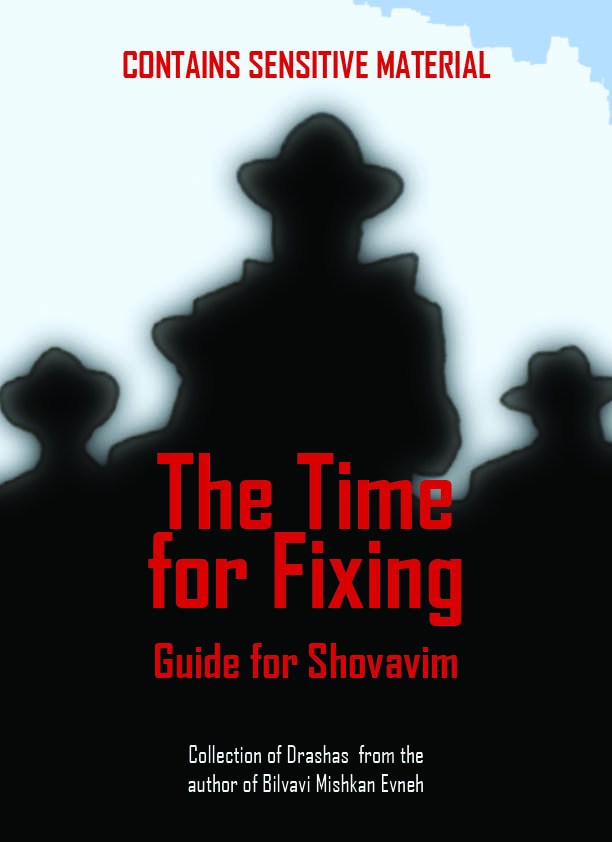- להאזנה דע את מידותיך 031 מים תאוה ואהבה
31 Eliminating Desires
- להאזנה דע את מידותיך 031 מים תאוה ואהבה
Understanding Your Middos - 31 Eliminating Desires
- 10753 reads
- Printer-friendly version
- שלח דף במייל
The Middos that come from Water in the Soul
We have merited to learn, at length, about the element of earth in the soul. Now we will begin, with Hashem’s help, to study our element of water.
Rav Chaim Vital writes (in sefer Shaarei Kedushah), that the element of water in the soul is the source of the middos known as taavah (desire), taanug (pleasure), chemdah (envy) and kinah (jealousy). A person desires pleasure, and the branching traits which result from this are envy and jealousy.
The first middah in our element of water we will discuss is taavah, desire (or lust).
Avraham Avinu is the personification of ahavah\love, which is a trait that is rooted in the element of water. What is the difference between having a taavah (desire\lust) for someone\something, which is evil, and having a genuine ahavah (love)?
From a superficial understanding, it would seem that when a person loves something that is proper, that is true love, and when a person loves something improper, it is just evil desire and lust.
Lust Separates, Love Unifies
But upon an inner understanding, the difference is that real love means to become one with another, while evil desire is to superficially “love” the other, remaining apart from the other.
This is because real love, which is ahavah, has the same numerical value as the word Echad – “One.” Love is only reached when we become one with the one whom we love. Love comes from being one with another, and it also leads to oneness with another.
Taavah\Lust, on the other hand, while appearing to look like love, really serves to separate people. When a person just “desires” the other and doesn’t really love the other, they grow further apart – as it is written, “When desire is seeked, there is separation.”
When is a desire just an evil desire and a lust – taavah - and when does it become love, ahavah?
Love is Based on a True Ratzon For Another
The Hebrew word for love is ahavah, which comes from two words – “Av bah”, “He wants it.” When a person wants something, when he has a true will for something, and thus he loves that thing.
Another way of understanding is that when one wants something, he feels a love to it, because the will, which means ratzon, comes from the word merutzeh – to feel satisfied by something.
The ratzon\will of a person is the root of the entire soul. This kind of will is the inner kind that a person has, the kind of will that is called “merutzeh”. It is not just any kind of will and desire that a person has – it is the ideal kind of will.
This helps us understand the difference between real love, ahavah, and fake love, taavah, which is just lust. When a person really loves another, he has a true and honest ratzon for that other person. He is merutzeh with that person. But when a person just has a lust for another, he is “loving” the person only because he’s missing something; he is not merutzeh with himself. There’s something he doesn’t have in his life, and he’s trying to replace his lack through having a relationship of “love with the other person.
That is why desires and lusts for another person just cause more separation between the two people, and it doesn’t create a genuine love. The person with mere desire for another person doesn’t seek to really love the other person, and thus his desire for the other person is merely selfish. It causes separateness between himself and the one whom he will attempt to “love.”
Desire, taavah, is essentially to desire something a person doesn’t have. When a person feels that he’s lacking something and he wishes to replace it through another person, it’s like he’s trying to “steal” for himself a satisfying feeling of satisfaction that will cure his emptiness. It is like what is written in Mishlei, “Stolen waters are sweet.”
Love Between a Husband and Wife
The Torah says that a man must leave his parents and cling to his wife, and that they should “become one flesh.” What is the ideal love between a husband and wife, according to the Torah’s view? Before they got married, they were two separate people, but now that they are married, they are one. That is genuine love – it takes a person and returns him to his original situation. The original situation of man was that he was just one, and in marriage, the love between a husband and wife can bring a person back to being “one”.
The Sages say that a man must love his wife “just as he loves his own body.” This is not a superficial kind of love – it’s not “romance” that people think. It is the love that Adam and Chavah had toward each other when they became one. It is to return to the ideal situation of man – to be one.
Ahavah\Love is Based on “Daas”, Taavah\Lust is When There is No Daas
When a person is asleep, he cannot connect with others. Sleeping is a time in which we are all apart from each other; when we sleep, we don’t have Daas, and when there is no Daas, we cannot love. But when we are awake, that is the time when we can connect with others, and that is the time when we have the chance to be unified with others. This shows us that our love towards others can only be when it is coming from our Daas.
Let’s say a man is unmarried, and he sees another woman and feels that he has “fallen in love” with her. It’s not love! The only love he can feel right now towards another woman is just taavah, lust. He cannot love, because love is to become one with another, and he cannot be one with her, because he is not married to her. For this reason, there is no such thing as a man loving another woman if they aren’t married.
A different way of understanding the difference between ahavah\love and taavah\lust is as follows.
When a person just has a lust and a desire for another, he thinks he loves the other person; he is attempting to “form” a relationship with the other person, because in reality, they are not one. He therefore attempts to “form” a relationship with the other through attempting love. But with real love – like in the ideal marriage between husband and wife - the person is not “forming” a relationship with the other; he is rather strengthening the already existing bond. He is deepening the bond that is already there.
This is essentially the difference between tzaddikim and the wicked, with regards to how they relate to Hashem. The wicked think that in order to become close to Hashem, one has to “form” a relationship with Him, and that is why they never get there. But the tzaddikim know that we get close to Hashem by strengthening our bond with Him that is already there and existing.
With taavah – mere desire and lust - it’s all about “Me.” Desire is to think about one’s own needs: “I feel a desire.” We can see how this is true both with regards to how we relate with people, and how we relate to Hashem.
When a person desires to have a relationship with Hashem, it could still be rooted in his own ego; “I feel a need to connect to Hashem”; he is only thinking about his own interests in his relationship with Hashem, not about the actual relationship. Such a person does not yet have ahavah towards Hashem; he merely has taavah…
But when a person wants to have a relationship of love with Hashem – not simply to desire a connection for his own interests, but because he sincerely wants there to be a relationship of love between him and Hashem – this is ahavah. It is to think about what comes before “Me”: Hashem. It is to think: “I am connecting myself to what was before my existence – Hashem. I am not forming anything new here – I am only deepening the bond that has always been here.”
What It Means To Truly Love Another Jew
If a person wants to have Ahavas Yisrael (love for Jews), it has to be the right kind of love. Why should we love our fellow Jews? We need to love other Jews simply because we are all a part of Hashem and the Torah! That is the proper way how we should view another Jew. If a Jew loves another Jew for any other reason, it is not real love!
What is Ahavas Yisrael? If a person really loves a certain friend of his, but not someone else, he has no Ahavas Yisrael yet! It is not real love, because it is a “specific” love. Real love for another Jew is to love each Jew unconditionally. Ahavas Yisrael is to have “no favorites” – it is to love every single Jew, without exception, regardless of our personal tastes.
Desiring The Eitz HaDaas Vs. Desiring The Eitz HaChaim
When a person is asleep, he cannot love others, as we said before. Only when two people are awake can they form a connection with each other and come to love each other. Why? Because love is only possible when a person has his Daas, which is only when one is awake. Love is only possible when there is Daas.
Thus, the way we fix our trait of taavah\evil lusts and desires, is by turning it into real love, ahavah.
When a person just lusts after and desires someone, it resembles the desire of Adam and Chavah to eat from the Eitz HaDaas, the Tree of Knowledge. Such a desire was evil, because it was simply a desire for knowledge. But the true kind of desire we need to have is to desire an honest and genuine love for another. We need to desire to eat from the Eitz HaChaim, the Tree of Life – in other words, we need to desire life itself, the ideal kind of life.
That was the depth behind why the Tree of Knowledge was forbidden to Adam and Chavah, and why the Tree of Life was permitted. To eat from the Tree of Knowledge is merely a desire for knowledge, and this is taavah. It represents lust, the detrimental kind of desire. Had they desired true life – to eat from the Eitz HaChaim – their desire would have been coming from a desire to have pure love for Hashem.
What is the difference between a desire for knowledge, which represents evil taavah, and a desire for life, which represents ahavah?
The Sages say that “Torah scholars have no rest.” Why? Because their Daas is constantly working, so they are always active. In this sense, they have no rest. When a person just has a desire for Daas, like a desire to know more and more information, then such Daas is evil. But when a person loves the true meaning of life itself, he wants to live in the right way. He has the true ratzon to have in life, and he will be merutzeh. He is pleased with his situation; he is happy with his lot in life. And as we brought before, being merutzeh will help a person reach true ahavah.
Uncovering Inner Happiness
Chazal say that one must be happy with his lot in life. To be happy with one’s lot in life doesn’t mean simply for one to simply be happy with whatever he has even though he doesn’t have other things. It is more than that; it is essentially to be happy with one’s very existence. Be happy with your mere existence!
How can we draw this inner happiness from within ourselves? We must know that if a person is happy only with whatever he constantly receives and gets, he really isn’t calm. He might get some happy feeling from wishing for what he wants, but this is not happiness. It’s like a desire to eat from the Tree of Knowledge – an endless desire that can’t be satisfied, an evil desire. To truly love life – to truly be happy with one’s lot -- a person has to be happy with the mere fact that he exists.
We know that a person has to have a simchas hachaim – a “love of life”. What does it mean to love life? Does it mean to simply love “life” in the superficial context? No. It means that a person should be so happy with his very own existence, with the mere fact that he lives!
When a person just has taavah\desire, he wants more and more to get added on to himself, and he doesn’t appreciate what he really has. He won’t be happy, and he will spend life chasing various taavah. But when a person has real ahavah\love for his life, he is appreciative of what he has; he is really happy - with himself, with his mere existence.
The Upper Waters and the Lower Waters
There are two kinds of water in creation – the “Upper Waters”, which are in the heavens, are waters of blessing, while the “Lower Waters”, which is the sky and the rain, bring destruction.
Evil desire, taavah. comes from the element of water in the soul, and so does ahavah\love. When we have evil desires, we aren’t happy with ourselves, so we want more; this comes from the Lower Waters in creation, the water that brings harm. But when we are happy with ourselves, we are using the right type of water in Creation – the Upper Waters, the waters in the Heavens, which only bring blessing.
When Physical Desire Is Holy
However, there is such a concept as taavoh d’kedushah – holy desires. When can desire be holy?
We are currently living after the sin of Adam, in which desires entered the world. Before the sin, Adam and Chavah were able to unite purely on a soul level, and the physical body was not involved in their union. Now that we are after a sin, the body is involved, so the faculty of physical desire is inevitable in the union. Since there is no way for the spouses to bond with each other without physical desire – now that we live after the sin of Adam – physical desire indeed has actually become an essential factor in the union. However, its role must be understood, or else it becomes disastrous to the relationship.
When we use physical desire solely for the sake of having the enjoyment of the physical desire, then we abuse our element of water. Instead of utilizing our element of water in the soul for ahavah\love, the love becomes lust, and this is the downfall of our entire element of water in the soul.
We need to use physical desire in a healthy way. We need both ahavah and taavah present in marriage; we will explain why.
A husband cannot only love his wife (ahavah) without having physical desire (taavah) for her, nor should he only have physical desire for her without having true love for her. If a person only loves his wife, but he has no physical desire for her, he is living in his imagination, and thinks he’s like an angel who doesn’t have any physical desires. He is delusional and acting evil.
The opposite problem, though, is when one just has a physical desire for his wife, but he doesn’t love her. He desires her, but only physically, and not because he wants to unify with her and become one with her through the union. Such a lifestyle resembles that of a non-Jewish marriage.
The way of the Jewish people, the way of the holy Torah, is to use our physical desires as a tool to reveal the love in our souls for another. This is the secret of taavah d’kedushah which the Jewish people possess.
NOTE: Final english versions are only found in the Rav's printed seforim »















